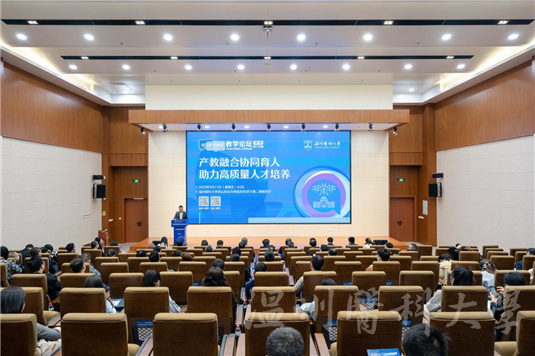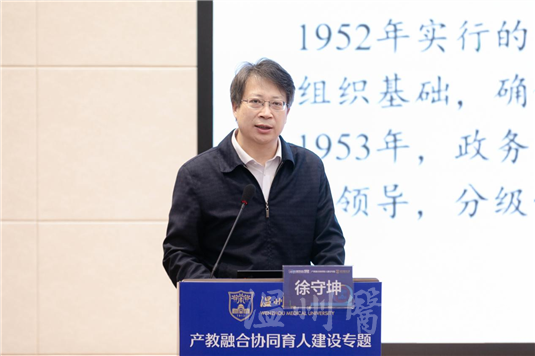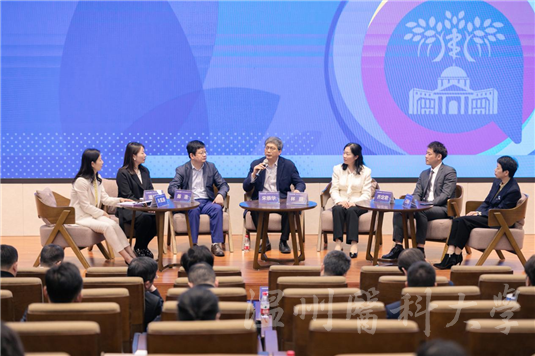- WMU Holds Special Event on Industry-Education Integration of "Teaching Forum"
- Author:Yang Mingzhe, Academic Affairs Office Date:April 3, 2023

On the morning of March 17, the 15th session of the "Teaching Forum", a special event on industry-education integration and cooperation in educating talents, was held in the report hall on the second floor of the Biomedical Research Building at Chashan Campus. Academician and President Li Xiaokun, Vice President Cao Jianming, Vice President, Zhu Xuebo, member of the WMU Party Committee and director of the Academic Affairs Office, attended the activity. Deans, school leaders in charge of teaching, and key teachers from non-directly affiliated hospitals took part in the event.

Li Xiaokun pointed out that the integration of industry and education will be an important factor for the sustainable development of a digital China. It is at the core of the development driven by leading enterprises of the industry, and is a light guiding the university’s transformation and upgrading of talent training. He hoped that through building an integrated system of production and education, making good use of the combination of education and production, and utilizing new platforms for industry-education integration, we could deepen school-enterprise cooperation and industry-education collaborative education, promote the in-depth integration of the supply side of talent training and the demand side of industrial development, and cultivate more suitable talents to meet the needs of industrial development.

At the meeting, the Provincial Modern Industry College Award Ceremony was held. Li Xiaokun presented the plaques to the industrial partners of the Ophthalmology and Optometry Industry College and the Biomedicine Industry College respectively.

Prof. Xu Shoukun, president of Changzhou University, gave a special lecture entitled "the era orientation and internal approach of deepening the integration of production and education in local universities". Xu profoundly interpreted the rich connotation of modern industrial colleges from the historical, theoretical, policy, and practical logic, and analyzed the current construction status of national-level modern industrial colleges from the aspects of cooperation mode, operation management, institutions and mechanisms, talent training, and cooperation between manufacturing, education and research. Changzhou University has promoted the transformation of talent cultivation concepts in an all-round way through focusing on the needs of industrial development, improving the vehicles of industry-education collaboration, and the supply of cutting-edge industrial resources. It has laid out professional chains and disciplinary chains around the industrial chain, deepened educational reform, unlocked the potential of industry-education integration for talent cultivation, and comprehensively promoted the coordinated development of talent training, scientific research, technological innovation, enterprise services, and student entrepreneurship.

Professor Song Gonghua of the School of Pharmacy of East China University of Science and Technology shared the valuable experience gained in the process of promoting the construction of the Modern Biomedical Joint Industry College under the title of "Building a High-Level Modern Industry College Serving the Needs of Industry Development". Song analyzed the immediate significance of building a modern industry college from three aspects: challenges faced by modern industrial development, the development process of higher education, and the national strategy of integrating production and education. Based on the university’s practice, he elaborated on how to build a modern industrial college from four aspects: school-running orientation, construction foundation, education models, and support mechanisms.



A round-table dialogue session was also set up at the Forum, where representatives from governments, enterprises, and schools were invited to share their understanding of deepening the integration of production and education and promoting high-quality talent training. Pan Lehui, deputy director of the Higher Education Division of the Wenzhou Municipal Education Bureau, introduced the policy support and future construction plan of the localities in the integration of production and education from the government's perspective. Qiao Dingjun, general manager of Zhejiang Kelun Medicine Trading Co., Ltd., and Wang Haibin, CEO of Zhejiang BioRay Biopharmaceutical Co., Ltd. talked about how to deepen and strengthen cooperation with schools from an enterprise perspective and to provide more high-quality applicable talents for enterprises. Chen Hao, head of the Ophthalmology and Optometry Industry College, and Lin Li, head of the Biomedicine Industry College, respectively, shared their exploration and practice of developing a talent training model around industrial innovation in light of the construction of their respective colleges. Professor Song Gonghua of East China University of Science and Technology who is in charge of a national industry college commented on the practice of enterprises and schools in promoting the integration of production and education.
Text translated by Li Xinlan and reviewed by Sun You
